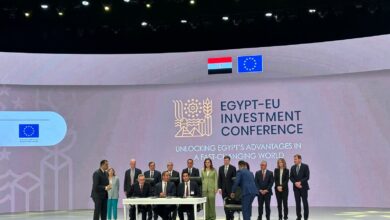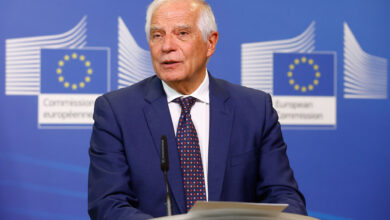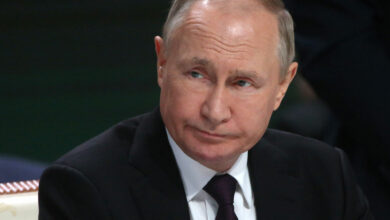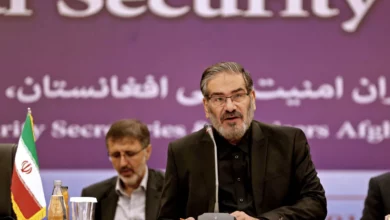The past month in Egypt has been a critical period in terms of testing the international community’s appetite for the domestic political agenda of the Muslim Brotherhood.
In the run-up to the ongoing referendum on the constitution, President Mohamed Morsy took several steps that riled large swaths of the population and might reasonably have elicited condemnations and reprimands from Western allies concerned with stability, democracy and human rights in the region. Responses, however, have been described as “mild” by observers, buttressing a widely-held premise that Western policy toward Egypt is centered around preserving regional security.
On 22 November, the presidential spokesperson announced Morsy’s constitutional declaration which, among other things, suspended all court cases against the Islamist-dominated Constituent Assembly and gave the president sweeping emergency powers. Opponents accused him of turning himself into a modern pharaoh, comparing his decision to Hitler’s Enabling Act of 1933 and coining the nickname “Morsilini” in reference to Italian fascist dictator Benito Mussolini.
Less than two weeks later, on 5 December, Morsy supporters attacked peaceful demonstrators outside the presidential palace and reportedly tortured dozens of them in makeshift cells to elicit false confessions.
Camaraderie
With the Islamist-friendly constitution poised to pass with a narrow majority, the United States, Egypt’s biggest financial backer and strongest military ally, continues to take a wait-and-see approach. In general, European governments have been more direct in criticizing Morsy’s actions but equally hesitant to take meaningful action.
The Obama administration issued a tepid response to Morsy’s power grab and the ensuing protests. “We call for calm and encourage all parties to work together and call for all Egyptians to resolve their differences over these important issues peacefully and through democratic dialogue,” said State Department spokesperson Victoria Nuland.
Nearly two weeks later, after clashes between the president’s supporters and his opponents left several Egyptians dead, Secretary of State Hillary Clinton made a sharper comment at a NATO ministerial meaning in Brussels on 6 December.
It is “not the Americans, not anyone else but the Egyptian people [who] deserve a constitution that protects the rights of all Egyptians, men and women, Muslim and Christian, and ensures that Egypt will uphold all of its international obligations,” Clinton said.
“Ultimately, it is up to the Egyptian people to chart their way forward,” she continued. “But we want to see a process that is inclusive and a dialogue that is truly open to a free exchange of ideas that will further the democratic process in Egypt.”
Obama echoed that tone in a statement released by the White House on 8 December after a telephone call to Morsy. “The president underscored that it is essential for Egyptian leaders across the political spectrum to put aside their differences and come together to agree on a path that will move Egypt forward,” it said.
The New York Times subsequently reported on 14 December that advisers to both presidents said Obama “did not reprimand” Morsy in this call, but rather “sought to build on a growing rapport with his Egyptian counterpart.”
These comments recall former policies towards the Mubarak regime — tolerating domestic transgressions for the sake of stability and cooperation on strategic initiatives. Nonetheless, the day after this phone call between Obama and Morsy, the Egyptian president partially annulled his previous constitutional declaration.
“There is always a gap between policy and public statements,” Nathan Brown, political science professor at George Washington University, told the Egypt Independent. “It is especially large in this case, because the US has a high profile in Egypt and US-Egypt relations are so complex.”
Yet the US has demonstrated leniency toward the Muslim Brotherhood since the group’s political wing ascended to the heights of the Egyptian government earlier this year. This has led many to question how an Islamist organization formerly designated as a terrorist group by the US government became a close ally, seemingly overnight.
Yielding to the realpolitik demands of international relations after Mubarak’s fall, the Obama administration sought a reliable partner in Egypt to secure its strategic interests including counterterrorism, Israel and the Suez Canal.
A working relationship with the Muslim Brotherhood began in the summer of 2011 when a credible alternative failed to emerge, and the US made what the Washington Post’s David Ignatius called the “cosmic wager.”
The result of over a year of communication and cooperation, Brown said, is that “US officials can see things through the Brotherhood’s eyes, and they don’t have the same visceral fear of the Brotherhood that earlier officials used to.”
Echoing that sentiment, Eric Trager, Next Generation fellow at the Washington Institute, told Egypt Independent that “the administration believes it can work with Morsy.”
The weakness of Egypt’s opposition groups only strengthens the alliance between Morsy and the Obama administration. The administration “doesn’t see his opposition as a viable alternative,” Trager continued, “because it’s not cohesive against anything other than Morsy and because it has a radical outlook that an elected president should be stepping down.”
More than anything else, though, Brown suggested that the US seeks to avoid taking sides. “The fundamental threat is that the US does not want to be seen as an actor in this crisis,” he said. “It’s also well aware that anything that it does will be seized upon. It’s already in a position where the opposition sees it as supporting the Brotherhood, and the Brotherhood comes back with ‘the US is always suspicious of Islamists.’”
Brown noted that the experiences of Hamas in Gaza and the Islamic Salvation Front in Algeria form the backdrop for US policy toward Egypt. Islamists in those countries were democratically elected and subsequently delegitimized, a situation which the US seeks to avoid repeating in Egypt.
As the battleground of a week-long conflict with Israel in mid-November, Gaza played a more direct part in the current US-Egypt relationship. Morsy’s principal role in negotiating a truce won him international appreciation, especially from the Obama administration.
“The administration thinks that, based on how the Gaza ceasefire was handled, Morsy can be a partner on foreign policy,” said Trager.
Morsy worked closely with Clinton and Obama during the negotiations and received praise from Washington when the deal was concluded.
“Morsy was clearly acting with some sense of timing: a critical stage in domestic Egyptian politics but also a sense of international opportunity that had to do with Gaza,” said Brown.
Keen on preserving this evolving camaraderie despite domestic turbulence, Morsy issued a statement in English on 14 December, directed at the Western press, defending his recent controversial decree and moves on the basis that the country is under counter-revolutionary threat, and renewing his commitment to dialogue with his opposition.
Meanwhile, one of the strongmen of the Brotherhood, Essam al-Haddad, became further empowered at the presidency, handling the foreign affairs portfolio, sometimes at the expense of involving the foreign ministry. A recent delegation sent by Morsy to Washington and headed by Haddad earlier in December was described by Washington Post editor Jackson Diehl as “fascinating.”
The neighbors
In contrast, European governments, by and large, have not built the same sort of relationships with the new Egyptian president. As disparate actors seeking to coordinate foreign policy through the European Union institutions, they often possess dissimilar interests and differing views of the region.
Michael Mann, the spokesperson for EU foreign affairs chief Catherine Ashton, echoed the Obama administration by calling for political dialogue and restraint on 3 December. Likewise, British Foreign Secretary William Hague released a statement on 6 December that advocated restraint on all sides and dialogue.
However, one day after Morsy’s constitutional declaration was announced, Marietje Schaak, a Dutch member of the European Parliament, warned: “The danger of a presidential tyranny looms.” She advocated an immediate freezing of EU financial assistance to Egypt until the decree was reversed.
The following week, Martin Schulz, a German politician and president of the European Parliament, described Morsy’s power grab as “a coup” in the German newspaper Frankfurter Allgemeine Zeitung. He added the EU “must make it absolutely clear that without pluralistic democracy in Egypt there can be neither economic nor political cooperation.”
Meanwhile, with smaller investments and fewer strategic interests in Egypt compared to the US, Europeans can arguably remain more faithful to their stated principles.
The European Bank for Reconstruction and Development (EBRD), for example, has a democracy mandate which conditions investment on tangible movement towards democracy. “What’s happened in the past few weeks could make it more difficult to make investments,” said Erik Berglof, chief economist at the EBRD, commenting on the protests and street battles that followed the constitutional declaration.
However, according to Olaf Boehnke, a German fellow at the European Council on Foreign Relations, Morsy’s retraction of the constitutional declaration on 9 December dialed back the opposition from Europe. “All options are on the table for the government in Cairo to get the EU’s full support,” he said. “The German government has an interest in the transformation process,” Boehnke said, “but we won’t do it at any price.”
This piece was originally published in Egypt Independent's weekly print edition.




